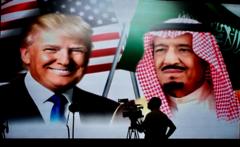As Arab and Islamic leaders gather in Saudi Arabia, speculation grows over Donald Trump's possible second presidency and its effects on Middle Eastern politics. While Gulf nations generally view Trump favorably due to his hawkish stance on Iran and warm relations with Saudi Arabia, the current geopolitical landscape, including recent Iran-Saudi diplomatic reconciliations, presents uncertainties ahead.
Middle East Leaders Weigh Implications of Potential Trump Presidency at Summit

Middle East Leaders Weigh Implications of Potential Trump Presidency at Summit
Amidst an Arab and Islamic summit in Saudi Arabia, leaders express mixed feelings regarding Donald Trump's potential return to power and its implications for regional stability.
As dozens of Arab and Islamic leaders convene in Saudi Arabia, speculation abounds regarding the potential implications of a second Donald Trump presidency on Middle Eastern dynamics. Contrary to the apprehensions expressed in Europe about Trump's unpredictability, many Gulf Arab nations perceive his leadership as a stabilizing force in a region rife with conflicts and tensions.
Prominent Emirati businessman Khalaf al-Habtoor articulated this sentiment in an opinion piece for Arab News, highlighting Trump's commitment to fortifying alliances and countering extremist influences as a hopeful trajectory for the Middle East, especially where security concerns are paramount. In Saudi Arabia, Trump's favorable reception starkly contrasts with that of President Joe Biden, particularly due to Biden's critical stance on human rights in the kingdom.
During his first term, Trump orchestrated significant diplomatic developments in the region, such as the Abraham Accords, facilitating relations between Israel and several Arab states. However, his record is complex; while he recognized Jerusalem as Israel's capital and validated Israel's annexation of the Golan Heights to the discontent of Arab nations, he also adopted a hawkish stance on Iran, withdrawing the U.S. from the Iran nuclear deal and approving aggressive actions against Iranian military leaders.
Yet, the Middle East landscape has transformed since Trump's last tenure. The ongoing conflict between Israel and Hamas, marked with military actions against Hezbollah and Iranian-backed Houthis, complicates matters further. The current Biden administration's perceived decline in U.S. influence contrasts sharply with Trump's staunch support for Israel, possibly giving Israel greater leeway to act against Iranian targets should he regain office.
Conversely, recent developments hint at a thawing relationship between adversarial regional powers, Iran and Saudi Arabia, who brokered a détente facilitated by China. As Saudi military leadership engages with Iran, there are emerging discussions regarding enhanced cooperation and security amidst a backdrop of calls to end conflicts in Gaza and Lebanon.
The ongoing summit reveals a mix of anticipation and caution about a Trump return; while Trump’s historical actions align with Gulf interests, current regional relations and a transformed geopolitical landscape introduce an element of unpredictability. With no guarantees that Trump would grant Israel all it seeks, the Middle East finds itself at a crossroads of optimism and uncertainty.



















